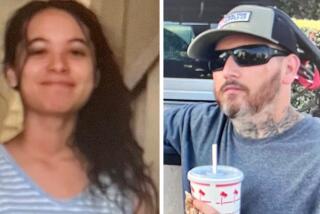Sandra Bland’s death and her family’s search for answers propel HBO’s ‘Say Her Name’
Reporting from New York — At 28, Sandra Bland had the world in front of her.
Driving from Illinois to Texas, Bland was ready for a fresh start at a new job at her alma mater, Prairie View A&M University, near Houston. But shortly after arriving in Texas, she was pulled over by a state trooper for failing to signal a lane change.
What started as a seemingly routine traffic stop on that day in July 2015 quickly escalated, with trooper Brian Encinia slapping Bland, pulling her out of the car and yelling, “I will light you up.” It ended with Bland’s arrest for allegedly assaulting the officer. Three days later, she was dead, found hanging in her cell at the Waller County Jail. Her death was ruled a suicide.
“Say Her Name: The Life and Death of Sandra Bland,” a new HBO documentary from Academy Award-nominated filmmakers Kate Davis and David Heilbroner, retraces the events of Bland’s disquieting arrest and the family’s subsequent lawsuit, while exploring questions raised about the circumstances surrounding the African American woman’s death.
The film premiered in April at Tribeca Film Festival to an audience that included members of Bland’s family, some of whom were seeing the documentary for the first time. It debuts Monday on HBO.
“What made Sandy special was what she made of herself as a woman. She was educated, articulate, ambitious,” Heilbroner said in an interview here during the festival. “Here’s someone who really represents the best that we could hope for, taken down by the authorities.”
News of Bland’s death spread quickly, in large part because of a social media push that adopted the hashtag #SayHerName, which gives the film its title. Within four days, the case made national headlines and soon caught the attention of Sheila Nevins, then-president of HBO Documentary Films.
“I was very moved by her,” Nevins said. “I thought there was more to the story. I thought this woman probably did not commit suicide unless she was provoked or something.”
Nevins immediately thought of Davis and Heilbroner, who previously collaborated with HBO on several films. The married couple first came to Nevins’ attention through Davis’ 2001 documentary, “Southern Comfort,” which was acquired by HBO and won the Grand Jury Prize at Sundance. Their documentaries have picked up numerous awards, including an Emmy, two Peabody Awards and an Oscar nod this year for their short film, “Traffic Stop.”
Bland’s death came at a time when the Black Lives Matter movement was making its presence felt, with protests breaking out nationwide over the much-publicized deaths of Trayvon Martin, Michael Brown, Walter Scott and Eric Garner. In the days following Bland’s death, the still-grieving family was reluctantly thrust into the spotlight.
“There have been many incidents with black women and black girls, but their names didn’t have staying power,” Sharon Cooper, one of Bland’s four sisters, said after the Tribeca screening. “For whatever reason, Sandy was chosen for a time such as this, so we felt like we had to pick up the armor and move forward.”
After a dozen phone calls to the family’s lawyer, Cannon Lambert, and an hours-long meeting near Chicago with Bland’s sisters and her mother, Geneva Reed-Veal, the filmmakers finally got permission to shadow the family as they searched for answers.
“When we talked to the family and asked whether they would be willing to make a documentary, Cannon Lambert looked at me and said, ‘If it turns out that we can’t prove that Sandy was murdered, do you still think you have a film worth making?’ I said, ‘Absolutely.’ She never should have been arrested in the first place. She never should have been jailed,” says Heilbroner, a former Manhattan prosecutor. “Whether someone went in there and killed her or whether she was ultimately driven to suicide, the system lynched her.”
The couple began shooting 10 days after Bland’s funeral, the same day Lambert filed a lawsuit in federal court on behalf of the family, claiming wrongful death and civil rights violations. Arresting officer Encinia, the Waller County sheriff and local law enforcement agencies were named as defendants.
Though Davis and Heilbroner had never met Bland, they had access to her video blog, which put the young woman’s ebullient personality and humor on full display. In her #SandySpeaks series, which she began shooting on her cellphone months before her death, Bland shared messages of unity among races and her thoughts on civil rights, police brutality, racial identity and her love for children and education. “I’m here to change history,” she cheerily says in her first video.
The documentary weaves together the trooper’s dashcam footage, a bystander’s video recording of the incident, candid interviews with family members, friends and Waller County Sheriff R. Glenn Smith and District Atty. Elton Mathis. (Encinia declined to be interviewed for the film.) Interspersed throughout are clips from the #SandySpeaks videos, allowing viewers to hear directly from Bland. Davis used the videos as a guide in addressing themes of the film.
“She really was about blacks and whites not being in a polarized standoff – that we need to hear each other,” Davis said. “Hearing law enforcement speak in combination with Sandra’s own messages of love and compassion helped me see on a sort of meta level that we all come to things with biases. It’s everywhere throughout society.”
The filmmakers felt it was crucial not to sugarcoat Bland, whose brushes with the law – a DUI and marijuana possession charges – as well as bouts of depression, are addressed in the film. “We didn’t want this to be a film about Saint Sandra Bland,” Heilbroner noted.
As protests erupted at the jail and across the nation, conspiracy theories began to pop up. Why was Bland alone in a cell? Why was a large trash bin with a plastic liner placed in her cell? Why were there no fingerprints or DNA on the bag Bland allegedly used to hang herself?
“Say Her Name” tracks the Waller County investigation and the family’s lawsuit to their surprising conclusions. While the family still does not believe justice was served, they hope the film will carry on Bland’s messages of racial unity and the need for change.
“I wanted to go from ‘what happened’ to ‘what happens now,” Reed-Veal said. “The main thing is, almost three years later, everybody still is keeping up with the story. That was the thing that I wanted in the beginning – for her not to be forgotten.”
‘Say Her Name: The Life and Death of Sandra Bland’
Where: HBO
When: 10 p.m. Sunday
Rating: TV-MA (may be unsuitable for children under the age of 17)
More to Read
Only good movies
Get the Indie Focus newsletter, Mark Olsen's weekly guide to the world of cinema.
You may occasionally receive promotional content from the Los Angeles Times.










